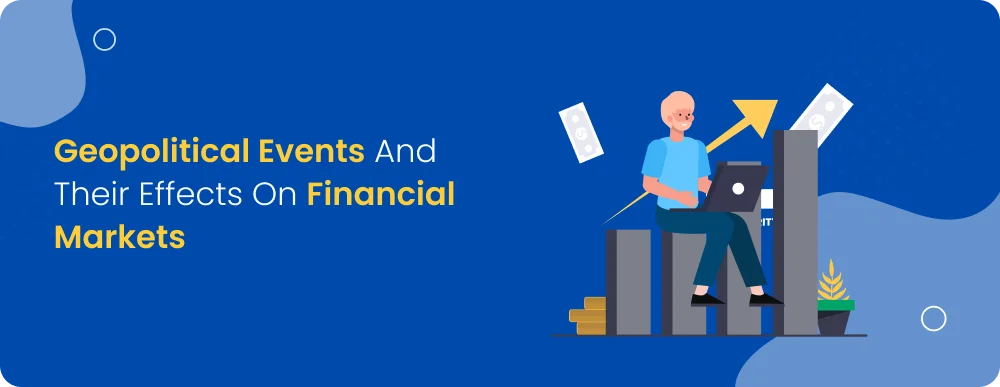Geopolitical Events And Their Effects On Financial Markets
Noor Kaur
13 Aug 2025Tags:
Market recap
Geopolitical events—such as wars, military conflicts, trade disputes, elections, and diplomatic standoffs—can significantly influence financial markets. These events create uncertainty, which affects investor sentiment, disrupts trade flows, impacts commodity prices, and shifts capital between countries.
Whether it’s the impact of war on stock markets or currency fluctuations due to political instability, markets often react sharply in the short term. Understanding these effects can help investors manage risk and make more informed decisions during volatile periods.
What Are Geopolitical Events?
Geopolitical events refer to significant developments involving political, military, or diplomatic actions that can influence global or regional stability. These include wars, border conflicts, international sanctions, elections, coups, trade disputes, and diplomatic standoffs between nations.
Such events can disrupt economic activity, trigger market volatility, and influence investor sentiment across asset classes, including equities, currencies, and commodities.
Immediate Effects on Financial Markets
When geopolitical events occur, financial markets often react instantly. Some of the common short-term effects include:
- Stock Market Volatility: Uncertainty leads to panic selling or sharp price swings, especially in risk-sensitive sectors like banking, travel, or defence.
- Flight to Safety: Investors move funds into safer assets such as gold, government bonds, or the US dollar.
- Currency Fluctuations: Emerging market currencies often weaken as foreign investors pull out capital.
- Oil and Commodity Price Spikes: Conflicts in oil-producing regions can push up global crude prices, adding inflation pressure.
- Drop in Foreign Investment: Heightened risk leads to delayed or cancelled FDI and FPI inflows.
Suggested Read: Understanding Sectors Before Investing in Stocks | mastertrust
What is the impact of war on stock markets?
The impact of war on stock market performance varies based on geography, duration, and the nature of the conflict. Historically, markets tend to fall sharply at the outbreak of war due to uncertainty, followed by a gradual recovery as the situation becomes clearer.
For example, the impact of war on the Indian stock market is often seen in:
- Immediate Index Declines: Key indices like the Nifty and Sensex may drop in reaction to news of escalation.
- Sector-Specific Moves: Defence stocks may rise, while sectors like aviation, tourism, and oil-dependent industries may fall.
- Currency Depreciation: INR tends to weaken against the USD due to higher crude prices and capital outflows.
- Foreign Investment Pullback: FPIs reduce exposure to Indian equities, impacting liquidity and valuation.
Case Studies of Major Geopolitical Events
Studying past geopolitical events helps understand how markets respond under pressure and what patterns repeat across time. Below are key case studies that highlight the impact of war on stock markets, currency movements, and investor behaviour:
Russia-Ukraine War (2022 – Present)
On February 24, 2022, Russia launched a full-scale invasion of Ukraine, sparking a global crisis. The war disrupted global energy, agriculture, and metals supply chains, given that both countries' significant exports are affected.
Market Impact:
- Global stock markets experienced a steep decline in the initial weeks. The S&P 500 fell over 10%, while European markets saw deeper corrections.
- Oil and gas prices spiked, with Brent crude crossing $120/barrel due to supply fears and sanctions on Russia.
- Safe-haven assets like gold, the US dollar, and US government bonds gained heavily.
- Indian stock market: The impact of war on the Indian stock market was visible as the Nifty 50 dropped over 1,200 points in a week. FPIs pulled out funds, weakening the rupee and pushing up bond yields.
Longer-Term Effects:
- Inflation surged globally, prompting aggressive rate hikes by central banks.
- Defence and energy stocks outperformed, while technology and interest-rate-sensitive sectors underperformed.
US-China Trade War (2018–2019)
The United States imposed tariffs on Chinese imports, and China retaliated. This led to prolonged trade tensions between the world’s two largest economies.
Market Impact:
- Global equity markets faced months of uncertainty.
- Volatility increased, especially in export-driven sectors like semiconductors, auto, and manufacturing.
- The yuan weakened against the USD, impacting emerging market currencies.
- Indian markets remained relatively resilient, but saw increased FPI volatility due to global uncertainty.
Investor Response:
- Shift to domestic-facing stocks and defensive sectors.
- Rise in gold and USD demand as safe assets.
Strategies for Trading During Periods of Uncertainty
Trading during geopolitical uncertainty requires a cautious, risk-managed approach. Price movements can be sharp, unpredictable, and driven by news rather than technicals. Here are some strategies that help navigate volatile conditions:
- Trade Smaller Position Sizes: Reduce exposure to limit losses in case of unexpected market swings.
- Focus on Highly Liquid Assets: Stick to instruments with strong volume and tight spreads for better entry/exit.
- Use Wider Stop-Loss and Trailing Stops: Account for increased volatility with wider risk buffers while protecting profits through trailing stops.
- Avoid Overtrading on News: Reacting to every headline can lead to losses. Let the initial volatility settle before entering trades.
- Use Safe-Haven Trades: During geopolitical events, assets like gold, USD, and government bonds often attract buying interest.
- Hedge Your Portfolio: Use options or inverse ETFs to protect long positions during sharp market corrections.
- Watch for Breakouts After Consolidation: Markets often consolidate before making decisive moves. Look for high-volume breakouts once a direction becomes clear.
Role of Central Banks and Governments
During geopolitical shocks, central banks and governments play a key role in stabilising markets and supporting economic activity:
- Interest Rate Adjustments: Central banks may cut rates to support growth or raise them to manage inflation caused by war-driven commodity spikes.
- Liquidity Support: Measures like bond-buying programs or emergency credit lines are used to maintain liquidity and confidence in the banking system.
- Foreign Exchange Intervention: To stabilise their currencies, central banks may intervene in forex markets, especially during large capital outflows triggered by geopolitical events.
- Fiscal Policy and Relief Packages: Governments may announce stimulus packages, tax breaks, or sector-specific relief measures to offset economic disruptions.
- Communication and Guidance: Clear statements from policymakers help manage expectations and reduce panic in the markets.
In India, for example, during periods of war affecting the Indian stock market, the RBI may take steps to stabilise the rupee, control inflation, or manage bond yields, while the government may revise defence spending, trade policies, or subsidy support to manage the economic impact.
Conclusion
Geopolitical developments are an unavoidable part of the global investing environment. Their impact on financial markets can be sudden, widespread, and often unpredictable. While events like war, elections, or sanctions may initially cause fear-driven market reactions, historical patterns show that markets eventually stabilise as new information emerges.
For investors, especially in emerging economies like India, closely tracking such events, assessing the war effect on the Indian stock market, and maintaining a risk-managed approach is essential for navigating uncertainty without losing sight of long-term goals. Since, our trading app offers global indices tracking, it may help investors like you stay informed about international market movements and gauge potential spillover effects early.
FAQs
How do geopolitical tensions affect currency exchange rates?
Geopolitical tensions often trigger volatility in currency markets. Investors move money into perceived “safe-haven” currencies like the US Dollar or Swiss Franc, causing emerging market currencies to weaken. For instance, during global conflicts, INR may depreciate as capital flows out of India. This is one of the early signs of broader economic stress tied to geopolitical events.
Can geopolitical events lead to a recession?
Yes. Major geopolitical events—like wars, sanctions, or prolonged diplomatic breakdowns—can disrupt trade, raise energy prices, and reduce business confidence. These effects can slow down economic activity globally or regionally, increasing the risk of recession, especially if the uncertainty is prolonged.
How should long-term investors respond to global uncertainty?
Long-term investors should avoid panic-selling and instead focus on asset allocation, diversification, and quality holdings. While the impact of war on the stock market can cause sharp corrections, markets often stabilise once uncertainty reduces. Reviewing risk exposure and rebalancing portfolios may be a better response than making sudden exits.
How do elections in major economies affect global stock markets?
Elections bring policy uncertainty. If results suggest major shifts in trade, taxation, or regulation, global markets may react sharply. For example, US elections often impact foreign markets due to policy direction on defence, tariffs, or interest rates. Such geopolitical events can cause short-term volatility in both developed and emerging markets.
How long do geopolitical events typically affect markets?
The war's effect on the Indian stock market or any market depends on how prolonged or severe the event is. Some events cause a one-time shock, while others—like military conflicts or sanctions—have longer, drawn-out impacts. Markets may react sharply at first but tend to stabilise once clarity returns.
How can retail investors stay updated on geopolitical developments?
Retail investors should track credible financial news sources, central bank updates, and government releases. Following macroeconomic commentary and geopolitical analysis from SEBI-registered advisors or reputed platforms can help understand the impact of war on the Indian stock market and make informed decisions during uncertain periods.
Noor Kaur
13 Aug 2025Related blogs
Sign up to our newsletter !
Share this article on
Recent articles
Tags:
Open a Demat Account in just 15 minutes !

Click on open
account below

Fill out some
basic details

Upload your
documents

Start trading in
24 Hours *
Commonly asked questions
Is Master Capital Services Limited SEBI registered?
Do you have a mobile app for Trading and Finance Management?
What services does mastertrust provide?
What is the minimum investment required to start trading with your company?
Is my personal and financial information secure with your company?
What is your customer support availability?





